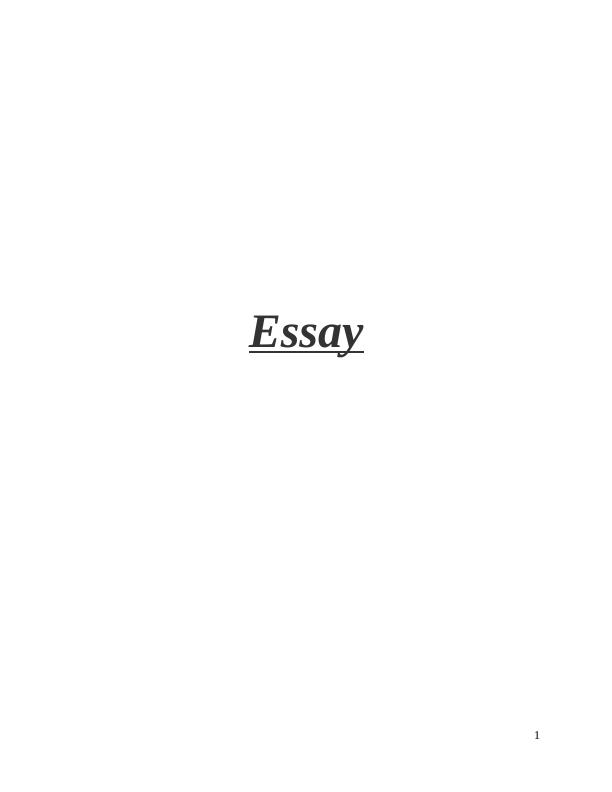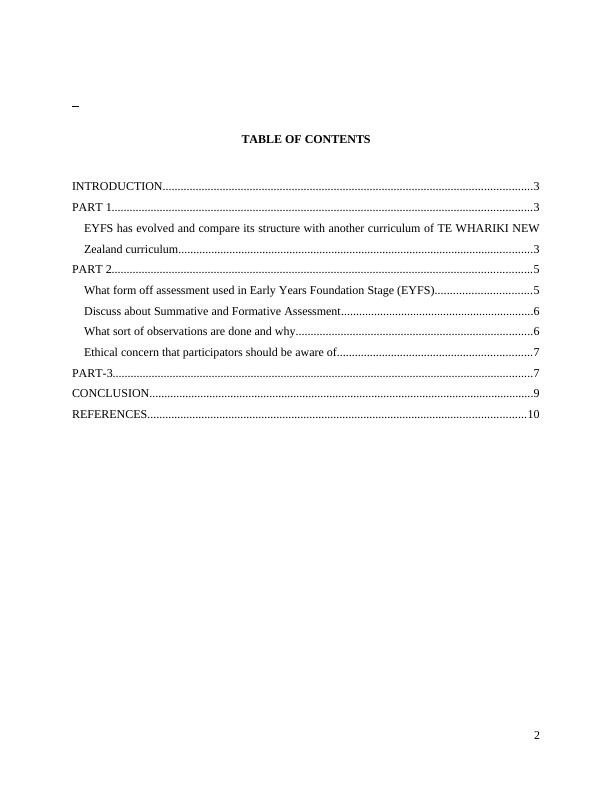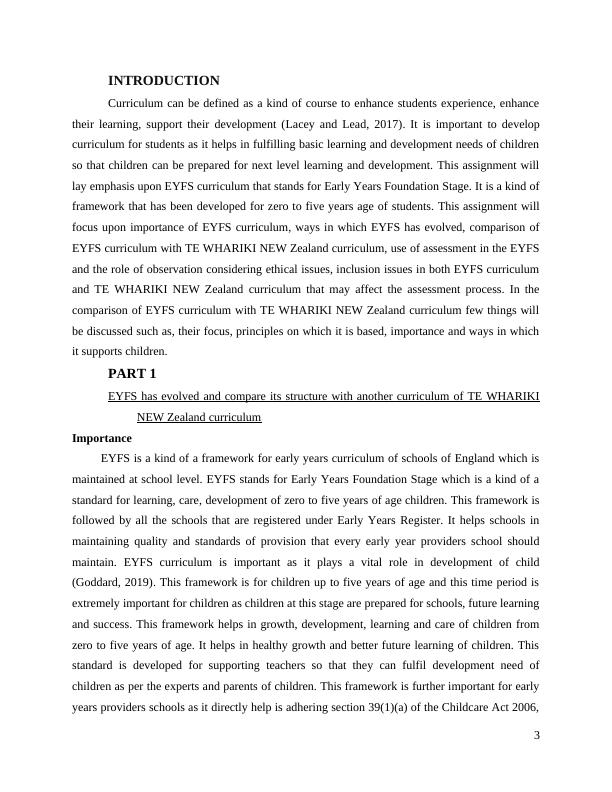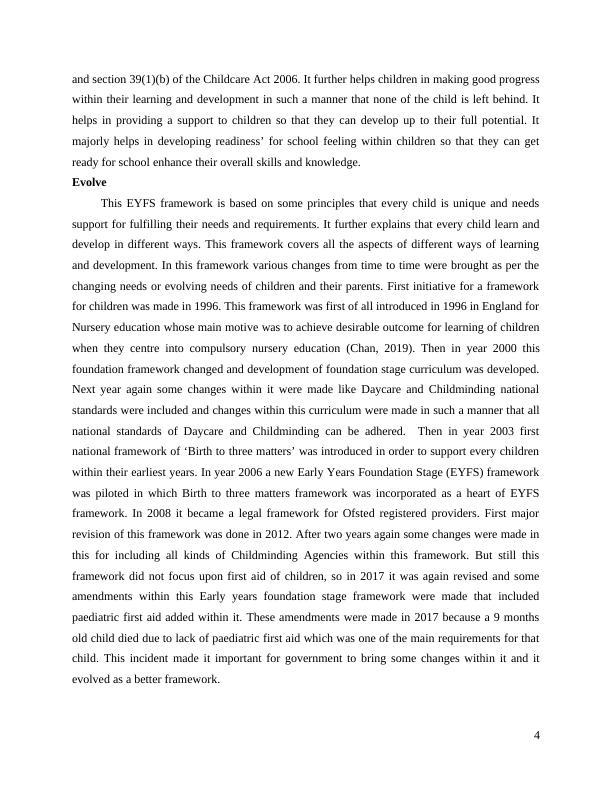Evolution and Comparison of EYFS and TE WHARIKI Curriculum
Added on 2022-12-30
11 Pages3760 Words66 Views
Essay
1
1

TABLE OF CONTENTS
INTRODUCTION...........................................................................................................................3
PART 1............................................................................................................................................3
EYFS has evolved and compare its structure with another curriculum of TE WHARIKI NEW
Zealand curriculum......................................................................................................................3
PART 2............................................................................................................................................5
What form off assessment used in Early Years Foundation Stage (EYFS)................................5
Discuss about Summative and Formative Assessment................................................................6
What sort of observations are done and why...............................................................................6
Ethical concern that participators should be aware of.................................................................7
PART-3............................................................................................................................................7
CONCLUSION................................................................................................................................9
REFERENCES..............................................................................................................................10
2
INTRODUCTION...........................................................................................................................3
PART 1............................................................................................................................................3
EYFS has evolved and compare its structure with another curriculum of TE WHARIKI NEW
Zealand curriculum......................................................................................................................3
PART 2............................................................................................................................................5
What form off assessment used in Early Years Foundation Stage (EYFS)................................5
Discuss about Summative and Formative Assessment................................................................6
What sort of observations are done and why...............................................................................6
Ethical concern that participators should be aware of.................................................................7
PART-3............................................................................................................................................7
CONCLUSION................................................................................................................................9
REFERENCES..............................................................................................................................10
2

INTRODUCTION
Curriculum can be defined as a kind of course to enhance students experience, enhance
their learning, support their development (Lacey and Lead, 2017). It is important to develop
curriculum for students as it helps in fulfilling basic learning and development needs of children
so that children can be prepared for next level learning and development. This assignment will
lay emphasis upon EYFS curriculum that stands for Early Years Foundation Stage. It is a kind of
framework that has been developed for zero to five years age of students. This assignment will
focus upon importance of EYFS curriculum, ways in which EYFS has evolved, comparison of
EYFS curriculum with TE WHARIKI NEW Zealand curriculum, use of assessment in the EYFS
and the role of observation considering ethical issues, inclusion issues in both EYFS curriculum
and TE WHARIKI NEW Zealand curriculum that may affect the assessment process. In the
comparison of EYFS curriculum with TE WHARIKI NEW Zealand curriculum few things will
be discussed such as, their focus, principles on which it is based, importance and ways in which
it supports children.
PART 1
EYFS has evolved and compare its structure with another curriculum of TE WHARIKI
NEW Zealand curriculum
Importance
EYFS is a kind of a framework for early years curriculum of schools of England which is
maintained at school level. EYFS stands for Early Years Foundation Stage which is a kind of a
standard for learning, care, development of zero to five years of age children. This framework is
followed by all the schools that are registered under Early Years Register. It helps schools in
maintaining quality and standards of provision that every early year providers school should
maintain. EYFS curriculum is important as it plays a vital role in development of child
(Goddard, 2019). This framework is for children up to five years of age and this time period is
extremely important for children as children at this stage are prepared for schools, future learning
and success. This framework helps in growth, development, learning and care of children from
zero to five years of age. It helps in healthy growth and better future learning of children. This
standard is developed for supporting teachers so that they can fulfil development need of
children as per the experts and parents of children. This framework is further important for early
years providers schools as it directly help is adhering section 39(1)(a) of the Childcare Act 2006,
3
Curriculum can be defined as a kind of course to enhance students experience, enhance
their learning, support their development (Lacey and Lead, 2017). It is important to develop
curriculum for students as it helps in fulfilling basic learning and development needs of children
so that children can be prepared for next level learning and development. This assignment will
lay emphasis upon EYFS curriculum that stands for Early Years Foundation Stage. It is a kind of
framework that has been developed for zero to five years age of students. This assignment will
focus upon importance of EYFS curriculum, ways in which EYFS has evolved, comparison of
EYFS curriculum with TE WHARIKI NEW Zealand curriculum, use of assessment in the EYFS
and the role of observation considering ethical issues, inclusion issues in both EYFS curriculum
and TE WHARIKI NEW Zealand curriculum that may affect the assessment process. In the
comparison of EYFS curriculum with TE WHARIKI NEW Zealand curriculum few things will
be discussed such as, their focus, principles on which it is based, importance and ways in which
it supports children.
PART 1
EYFS has evolved and compare its structure with another curriculum of TE WHARIKI
NEW Zealand curriculum
Importance
EYFS is a kind of a framework for early years curriculum of schools of England which is
maintained at school level. EYFS stands for Early Years Foundation Stage which is a kind of a
standard for learning, care, development of zero to five years of age children. This framework is
followed by all the schools that are registered under Early Years Register. It helps schools in
maintaining quality and standards of provision that every early year providers school should
maintain. EYFS curriculum is important as it plays a vital role in development of child
(Goddard, 2019). This framework is for children up to five years of age and this time period is
extremely important for children as children at this stage are prepared for schools, future learning
and success. This framework helps in growth, development, learning and care of children from
zero to five years of age. It helps in healthy growth and better future learning of children. This
standard is developed for supporting teachers so that they can fulfil development need of
children as per the experts and parents of children. This framework is further important for early
years providers schools as it directly help is adhering section 39(1)(a) of the Childcare Act 2006,
3

and section 39(1)(b) of the Childcare Act 2006. It further helps children in making good progress
within their learning and development in such a manner that none of the child is left behind. It
helps in providing a support to children so that they can develop up to their full potential. It
majorly helps in developing readiness’ for school feeling within children so that they can get
ready for school enhance their overall skills and knowledge.
Evolve
This EYFS framework is based on some principles that every child is unique and needs
support for fulfilling their needs and requirements. It further explains that every child learn and
develop in different ways. This framework covers all the aspects of different ways of learning
and development. In this framework various changes from time to time were brought as per the
changing needs or evolving needs of children and their parents. First initiative for a framework
for children was made in 1996. This framework was first of all introduced in 1996 in England for
Nursery education whose main motive was to achieve desirable outcome for learning of children
when they centre into compulsory nursery education (Chan, 2019). Then in year 2000 this
foundation framework changed and development of foundation stage curriculum was developed.
Next year again some changes within it were made like Daycare and Childminding national
standards were included and changes within this curriculum were made in such a manner that all
national standards of Daycare and Childminding can be adhered. Then in year 2003 first
national framework of ‘Birth to three matters’ was introduced in order to support every children
within their earliest years. In year 2006 a new Early Years Foundation Stage (EYFS) framework
was piloted in which Birth to three matters framework was incorporated as a heart of EYFS
framework. In 2008 it became a legal framework for Ofsted registered providers. First major
revision of this framework was done in 2012. After two years again some changes were made in
this for including all kinds of Childminding Agencies within this framework. But still this
framework did not focus upon first aid of children, so in 2017 it was again revised and some
amendments within this Early years foundation stage framework were made that included
paediatric first aid added within it. These amendments were made in 2017 because a 9 months
old child died due to lack of paediatric first aid which was one of the main requirements for that
child. This incident made it important for government to bring some changes within it and it
evolved as a better framework.
4
within their learning and development in such a manner that none of the child is left behind. It
helps in providing a support to children so that they can develop up to their full potential. It
majorly helps in developing readiness’ for school feeling within children so that they can get
ready for school enhance their overall skills and knowledge.
Evolve
This EYFS framework is based on some principles that every child is unique and needs
support for fulfilling their needs and requirements. It further explains that every child learn and
develop in different ways. This framework covers all the aspects of different ways of learning
and development. In this framework various changes from time to time were brought as per the
changing needs or evolving needs of children and their parents. First initiative for a framework
for children was made in 1996. This framework was first of all introduced in 1996 in England for
Nursery education whose main motive was to achieve desirable outcome for learning of children
when they centre into compulsory nursery education (Chan, 2019). Then in year 2000 this
foundation framework changed and development of foundation stage curriculum was developed.
Next year again some changes within it were made like Daycare and Childminding national
standards were included and changes within this curriculum were made in such a manner that all
national standards of Daycare and Childminding can be adhered. Then in year 2003 first
national framework of ‘Birth to three matters’ was introduced in order to support every children
within their earliest years. In year 2006 a new Early Years Foundation Stage (EYFS) framework
was piloted in which Birth to three matters framework was incorporated as a heart of EYFS
framework. In 2008 it became a legal framework for Ofsted registered providers. First major
revision of this framework was done in 2012. After two years again some changes were made in
this for including all kinds of Childminding Agencies within this framework. But still this
framework did not focus upon first aid of children, so in 2017 it was again revised and some
amendments within this Early years foundation stage framework were made that included
paediatric first aid added within it. These amendments were made in 2017 because a 9 months
old child died due to lack of paediatric first aid which was one of the main requirements for that
child. This incident made it important for government to bring some changes within it and it
evolved as a better framework.
4

End of preview
Want to access all the pages? Upload your documents or become a member.
Related Documents
Comparison of EYFS and Montessori Curriculalg...
|15
|3953
|2
Policies on Early Childhood Educationlg...
|5
|988
|22
Early Childhood Education: PDFlg...
|12
|2859
|147
Planning for Children's Learninglg...
|10
|2625
|67
Unit 2 Assessment Task of Schools as Organisationlg...
|45
|14466
|227
Role of Children Educators in Te Wahiti 9TE WARIKIlg...
|11
|1930
|157